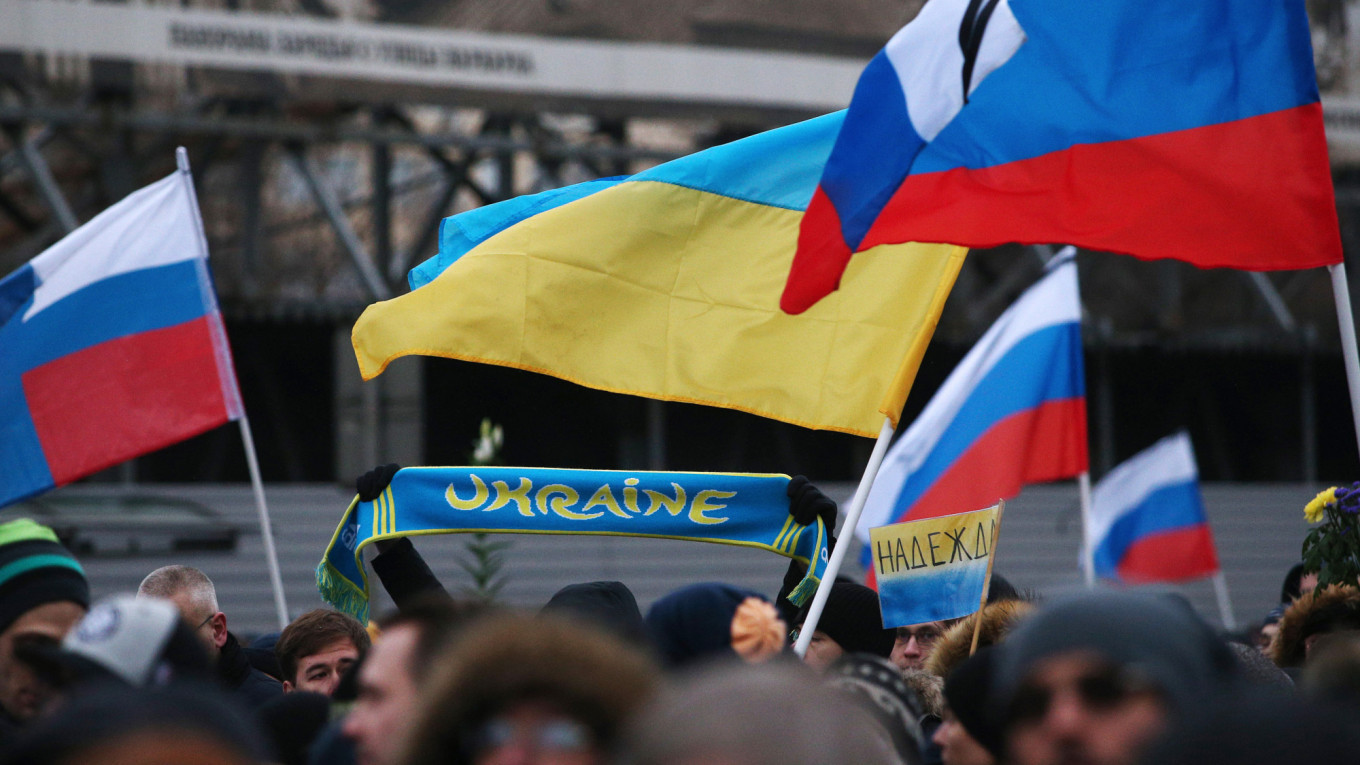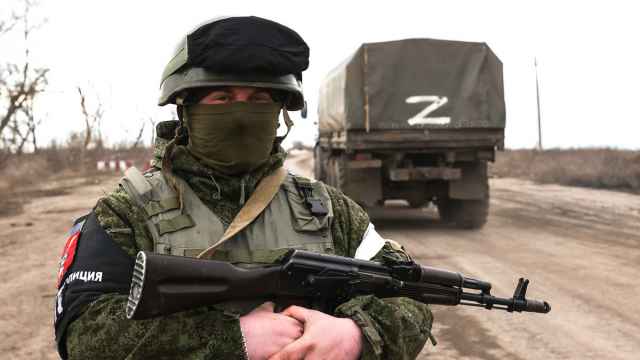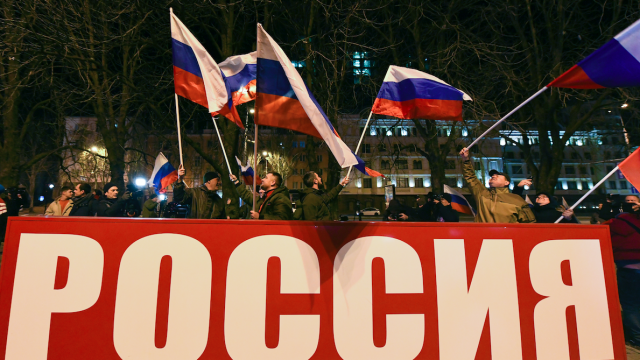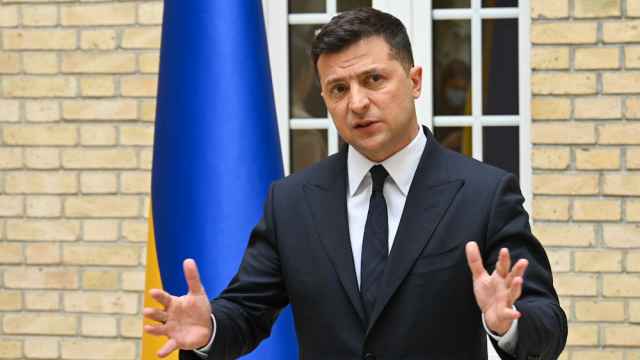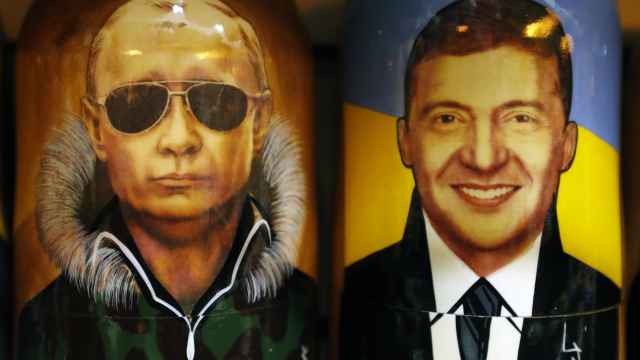Western countries have grown increasingly nervous in recent days over signs of a Russian military buildup close to the conflict in eastern Ukraine and on the annexed Crimean peninsula.
The conflict in eastern Ukraine — which broke out in 2014 following Ukraine’s pro-Europe Maidan revolution and Russia’s annexation of Crimea — has seen repeated flare-ups since a ceasefire was brokered in 2015, but the warnings and statements coming from Moscow, Kiev and Washington are the most serious and strongly worded in months.
Background
Moscow and Kiev have been locked in conflict since 2014, when Russia annexed Crimea and Russian-backed separatists in Ukraine’s Donbass started a bloody civil war, declaring independence for the Donetsk and Luhansk regions.
The United Nations says more than 13,000 people have died in the fighting — most in the first few bloody months as the Moscow-backed separatists and Ukrainian forces battled for territory.
Despite an EU-brokered ceasefire known as the Minsk Protocol that came into force in 2015, there have been repeated bouts of conflict since, as the two sides face off across a 500-kilometer frontline dividing the disputed territory between Ukrainian forces and the Russia-backed separatists. Peace talks have been largely stalled for the last six years.
The conflict-monitoring Organization for Security and Co-operation in Europe (OSCE) continues to report dozens, sometimes hundreds, of ceasefire violations every day, and Ukrainian President Volodymyr Zelenskiy said Thursday that 20 Ukrainian servicemen have been killed so far in 2021 — including four earlier this week in the deadliest single confrontation for months — and another 57 injured.
What developments have we seen this week?
- Several reports, including videos and photos shared on social media, have documented significant Russian military presence being deployed both in Crimea — the home of Russia’s Black Sea Fleet which Russia annexed from Ukraine in 2014 — and near the border between Russia and the conflict zone in eastern Ukraine.
- An estimated 4,000 Russian troops have been deployed to the border with Ukraine, according to the New York Times, citing an unnamed U.S. official. The paper also reported that in response to the troop buildup, the U.S. military’s European Command has raised its alert level to its highest setting — “potential imminent crisis.”
- Four Ukrainian servicemen were killed and seven injured in fighting earlier this week, the most deadly military incident in the conflict so far this year.
- In Crimea, analysts have pointed to months-long water shortages as a possible source of tensions. These were partly triggered by Ukraine switching off supplies via the North Crimea Canal, which used to account by 85% of the peninsula’s water supply, following the annexation.
Who said what?
-
U.S. President Joe Biden expressed firm support for Ukraine in a call to Zelenskiy Friday, the White House said. Biden "affirmed the United States' unwavering support for Ukraine's sovereignty and territorial integrity in the face of Russia's ongoing aggression in the Donbas and Crimea," the White House said in a statement.
- The United States has blasted Russia for its “aggressive and provocative actions,” which it says are designed to intimidate Ukraine, and the NATO military alliance held an urgent meeting Thursday evening, expressing concern about Russia’s military buildup. In a phone call between defence chiefs Thursday, Washington told Kiev it would “not leave Ukraine alone in the event of escalating Russian aggression,” a statement published by the Ukrainian defence ministry read.
- Russia has said its troop movements are defensive in nature. Presidential spokesman Dmitry Peskov told reporters Thursday that Russia had the right to move military units and troops around the country as it pleased, adding “it should not worry anyone and does not pose a threat to anyone.” For weeks the Kremlin has argued Ukraine has also been moving military units toward the conflict zone.
- But Russia has also responded to warnings from the U.S. and NATO in stronger terms. Peskov said Friday the situation in eastern Ukraine is precarious and risks boiling over at any point, adding that deployment of NATO troops near the conflict zone or Russia’s borders would trigger a response from Moscow. Foreign Minister Sergey Lavrov has warned another escalation in the Donbass would “destroy” Ukraine, Russia’s state-run TASS news agency reported Friday.
- Ukraine has appeared to downplay the possibility of a serious military escalation in the conflict, while continuing to warn about the Russian troop presence. Its parliament released a statement earlier this week outlining increased artillery shelling from separtist-held areas and a buildup of Russian military equipment.
- Ukrainian Foreign Minister Dmytro Kuleba said: “Russia’s current escalation is systemic [and] the largest in recent years,” but added: “The only way out is diplomacy.” President Zelenskiy said Friday: “Muscle-flexing in the form of military exercises and possible provocations along the border are traditional Russian games.”
What might happen next?
- Analysts are divided on what the Russian troop movements mean and the threat they could pose to a possible reescalation of the conflict. Some believe the Kremlin is flexing its muscles in an attempt to reinvigorate peace talks, push Ukraine into a more favorable settlement and to test the new U.S. administration’s commitment to Kiev. Others fear the buildup could be a prelude to a new round of Russian aggression.
- Michael Kofman, a senior research analyst with CNA and expert on the Russian military said the former scenario is more likely, noting that the current troop levels are unlikely to be enough for a serious military escalation on Russia’s behalf.
- The Conflict Intelligence Team, an open source intelligence outfit which monitors Russia’s military and security services, also said the buildup could be “posturing intended to threaten Ukraine.” Analysts there pointed to Ukraine’s recent banning of three Kremlin-friendly media outlets — a move seen in Moscow as an attack on Russian-speakers in Ukraine and a direct threat to Russia’s influence in the country.
- Russian military expert, James Sherr, senior fellow at the Tallinn-based International Centre for Defence and Security who has advised western governments on Russia’s military capabilities wrote that he sees “a localized escalation, dramatic and devastating, leading to the deployment of Russian ‘peacekeepers’ on the current demarcation line, as probably the most realistic option.”
AFP contributed reporting.
A Message from The Moscow Times:
Dear readers,
We are facing unprecedented challenges. Russia's Prosecutor General's Office has designated The Moscow Times as an "undesirable" organization, criminalizing our work and putting our staff at risk of prosecution. This follows our earlier unjust labeling as a "foreign agent."
These actions are direct attempts to silence independent journalism in Russia. The authorities claim our work "discredits the decisions of the Russian leadership." We see things differently: we strive to provide accurate, unbiased reporting on Russia.
We, the journalists of The Moscow Times, refuse to be silenced. But to continue our work, we need your help.
Your support, no matter how small, makes a world of difference. If you can, please support us monthly starting from just $2. It's quick to set up, and every contribution makes a significant impact.
By supporting The Moscow Times, you're defending open, independent journalism in the face of repression. Thank you for standing with us.
Remind me later.


